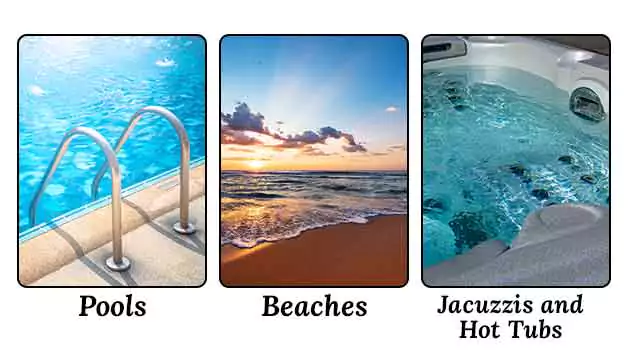Traditionally from Asia, henna tattoos are becoming more and more popular each day. They are a safer form of semi-permanent tattoo that are relatively safe to put on the skin and have great microbial properties and can actually help rejuvenate your hair. The simplest way to explain how a henna tattoo works is that it stains the skin leaving behind an orange or dark brown stain on your skin. This is considered to have a little water resistant where water won’t necessarily wash it off.
But can you swim with henna tattoo? While henna is considered to have somewhat of a water resistance, it might be detrimental to your henna tattoo if you were to go swimming! Not just that, the place where you swim also matters, where the beach or swimming pool can cause different types of effects on the tattoo. So if you were wondering if you can swim with it, you have come to the right place!
Key Takeaways
- Henna is made of Lawsone combined with keratin on the skin which washes away with water.
- You could swim with your henna tattoo on beaches and pools, but you risk messing up the design of your tattoo instead!
- If you really want to swim with your henna tattoo, be sure to keep it protected with oil, butter, and Saniderm wrap.
Water and Henna Tattoo

So what does happen when henna comes in contact with water? The dye molecule that is responsible for henna tattoo staining comes from the Lawsone molecule binding with the keratin on the epidermis of the skin. When these two molecules bind together, it leaves behind the characteristic henna stain on your skin responsible for the tattoo.
Now that we got that little science lesson out of the way, what does that mean for water? The henna stain will only go away when the skin under the henna is slowly exfoliated. This happens naturally as your body sheds its skin and slowly gets rid of the staining on your body. When this comes in with water, the skin sheds faster as the water carries it away.
So yes, henna is somewhat water-resistant as it will still be able to hold onto most of the stain. However, with constant contact with water eventually, the water will make the henna fade faster!
✨ You May like: Can You Color Over A Black Tattoo?
Henna Tattoo and Swimming
So what about swimming with a henna tattoo? Well, as I have said previously, constant contact with water will eventually wear out the henna and cause the stain to fade away faster. But here is the catch: there are different types of swimming that you can do based on the location. Swimming along the beach and swimming in a pool is completely different because of the chemical composition of the water. Even jacuzzis and hot tubs are completely different from regular swimming. So let’s look at them in more detail:

Pools
Swimming pool water is sanitized with chlorine to help keep the water clean from germs and dirt. However, chlorine is also a very good bleaching agent, meaning it cleans stains very easily. And henna being a stain, it will also take the stain off your skin very easily! It is also very important to note that you should not be in contact with any water, let alone swimming pool water, for the first 12 to 24 hours after getting the henna tattoo as it is going through its darkening process. If you were to swim in a pool, you are more than likely to ruin this process and make the henna tattoo fade faster!
Beaches
Unlike pools, beaches don’t have chlorine. It does have a lot of salt however, and if you don’t know but salt has natural exfoliating properties to it. Prolonged swimming along the beach will readily cause your skin to shed faster and take off the henna tattoo! You can subvert this by putting on some shea butter or coconut oil on your henna tattoo before taking a dip at the beach but it won’t last long. At most, it will an hour become the abrasive salts in the water will take off the henna stain from your body. You should avoid petroleum jelly as it will lighten the henna tattoo!
Jacuzzis and hot tubs
Technically not swimming but if you were to soak in a hot tub, you are risking your henna tattoo’s longevity! The hot water from jacuzzis and hot tubs will cause the henna stain binding on your skin to weaken quicker, making it fade faster as a result! Warmth however is good for your henna during the darkening process, just not when it means being in contact with water. The warm water will open up your pores and cause your skin to shed faster, taking away the henna stain with it.
See Also : Best Henna Tattoo Kit
Protecting Henna Tattoo While Swimming
Now if you are the type to still want to go swimming even after getting a henna tattoo, there are some ways that you can help keep the henna tattoo safe and still enjoy the water.
So here are some ways you can protect your henna tattoo while swimming:

- Shea butter: the emollient properties of shea butter will lock in moisture coming into the skin and protect the henna tattoo.
- Coconut oil: just like shea butter, coconut oil will also protect the henna tattoo because it won’t mix with the water and act as a barrier.
- Saniderm: wearing Saniderm over your henna tattoo will act as the barrier to stop water from reaching the tattoo and in turn protect it, even in hot waters like hot tubs. Just be sure that the corners are not peeling in the heat
You can use a variety of butter or oil (like cocoa butter or olive oil) or a derma wrap like Tegaderm, SecondSkin, DermShield, etc. They follow the basic principles of the ones mentioned above! Just make sure to avoid petroleum jelly-based products as they will lighten your henna tattoo.
FAQs
Are henna tattoos waterproof?
Henna tattoo is more water-resistant than waterproof, meaning it will eventually fade away when in prolonged contact with water.
Does pool water affect henna tattoos?
Yes, it does! The chlorine present in pool water can help bleach the henna stain on your body and lighten it.
Is sunbathing good for henna tattoos?
Not only is it good for henna tattoos, but it will also make the darkening process faster and way better! Heat on henna will help to darken the tattoo and keep it more vivid for longer.
Final Thoughts
Will swimming with a henna tattoo harm you in any way? No, it will not, your skin will be perfectly fine regardless if you swim or not with it. But will it smudge, fade, and completely mess up the design of your henna tattoo? Yes, absolutely! You could swim with your henna tattoo if you are not concerned with your henna design, but if you want to prolong it then you should avoid swimming in pools or remaining in contact with water for too long. You could use oils and butter to help protect your henna tattoo but avoid petroleum jelly at all costs!
✨ Next Attraction: Top 10 Best Stick and Poke Tattoo Kit In 2023

